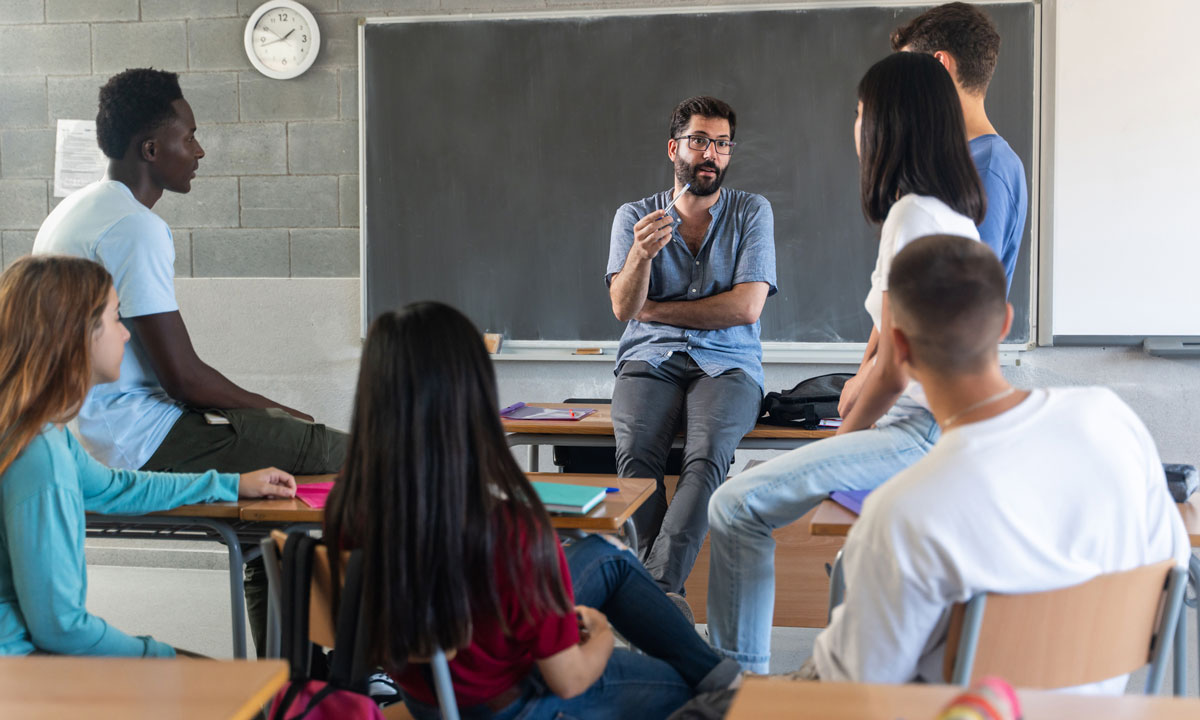Utah Bill Requiring Teachers be Politically ‘Neutrals’ Fails by Narrow House Vote
HB303 would have restricted LGBTQ+ symbols such as Pride flags; stalls with numerous Republicans voting against it.

Get stories like this delivered straight to your inbox. Sign up for The 74 Newsletter
A bill that would have controlled what teachers can and can’t say — or display — in their classrooms has hit a dead end.
The Utah House on Monday narrowly voted down HB303, a bill that would have banned teachers from “endorsing, promoting or disparaging” certain beliefs or viewpoints, including religious or political beliefs and sexual orientation or gender identity.
The bill sponsored by Rep. Jeff Stenquist, R-Draper, faltered on a 32-39 vote, with several Republicans joining Democrats in opposition.
It’s the end of the line for the legislation — at least this year. Stenquist told Utah News Dispatch in a text message Monday that he likely won’t seek to resurrect it during the remaining four days of the 2024 legislative session that’s set to end before midnight Friday.
However, Stenquist said he’ll continue to work on it perhaps for 2025.
The vote came after the bill was altered on the House floor earlier Monday morning, when Rep. Neil Walter, R-St. George, successfully changed the bill to strip out language that also would have regulated teachers’ “social beliefs” — one of the bill’s terms that teacher advocates worried was too broad and vague.
“I’m concerned ‘social belief’ could (mean) anything they might believe,” Walter said.
He argued regulating “social beliefs” could create a chilling effect in classrooms, worried it could make teachers fear “inadvertently running afoul” of the law and therefore cause them to be “very careful, too careful” in some contexts.
“For example, I think we would all acknowledge and agree … that (Adolf) Hitler was an evil man,” Walter said, “but there could be people who were taught or feel that they have a social belief that he is not. We wouldn’t want to put a teacher … in a classroom in jeopardy for saying something that might persuade (a student) to reconsider their views.”
The bill would have would required teachers to tread carefully as to not sway a student to change their beliefs.
Walter’s version also would have allowed teachers to display “personal photographs” in general rather than only photographs of their family members.
Stenquist asked the House not to adopt Walter’s version, arguing that it would open a “big loophole” in the intent of the bill with regard to displaying photographs. He also worried removing “social beliefs” from the bill would allow scenarios where teachers could talk about “certain ideologies and world views that maybe don’t fit neatly in a political bucket or religious bucket.”
Stenquist started working on the legislation about a year ago, after some parents expressed concerns about a teacher talking about pronouns and gender identity with young students outside of curriculum. However, Stenquist has said his bill isn’t meant to regulate certain viewpoints, but rather ensure teachers remain politically and socially “neutral” in the classroom.
“Parents want to know” teachers aren’t pushing “other types of worldviews or ideologies” onto students that some parents “may not be comfortable with,” Stenquist said. “And that applies to all parents, regardless of what end of the political spectrum you may fall.”
Stenquist acknowledged concerns swirling around the bill over regulating what teachers can and can’t say, but he argued his bill would address a “perception out there that our students are being pushed toward particular ideologies.”
“This really is about giving our students a space to focus on curriculum and focus on learning without the classroom becoming a forum in the other social discussions and divisiveness that’s happening in society at large,” Stenquist said. “Let’s just allow the classroom to be free of political social ideologies and activism.”
Democrats including Rep. Joel Briscoe, D-Salt Lake City, a former high school teacher, argued against the bill, questioning how teachers should navigate its restrictions while also trying to encourage students to think critically.
“I’m telling you, this bill will scare teachers,” Briscoe said.
He pointed to a recent survey by RAND, a nonprofit research organization, that found two-thirds of U.S. K-12 public school teachers are limiting their own instruction about political and social issues in the classroom.
“It doesn’t matter whether their state has passed a law saying they can’t do it. They’re just afraid. They’re scared as teachers,” Briscoe said, raising his voice on the House floor.
He added he doesn’t think Stenquist or the bill’s supporters are trying to scare teachers. “I think they’re good people who have good intentions,” Briscoe said, but he argued the bill will have that effect. “I don’t think that’s what’s best for our children in our classrooms.”
Walter said he’s also concerned about “unintentionally sterilizing a classroom,” but given the Utah State Board of Education already has a rule about political statements, he said removing “social beliefs” from the bill would address his concerns.
After Walter changed the bill, the House put the legislaton on hold until later Monday afternoon, when Stenquist unsuccessfully tried to pass it out to the Senate.
Utah News Dispatch is part of States Newsroom, a nonprofit news network supported by grants and a coalition of donors as a 501c(3) public charity. Utah News Dispatch maintains editorial independence. Contact Editor McKenzie Romero for questions: info@utahnewsdispatch.com. Follow Utah News Dispatch on Facebook and Twitter.
Get stories like these delivered straight to your inbox. Sign up for The 74 Newsletter

;)